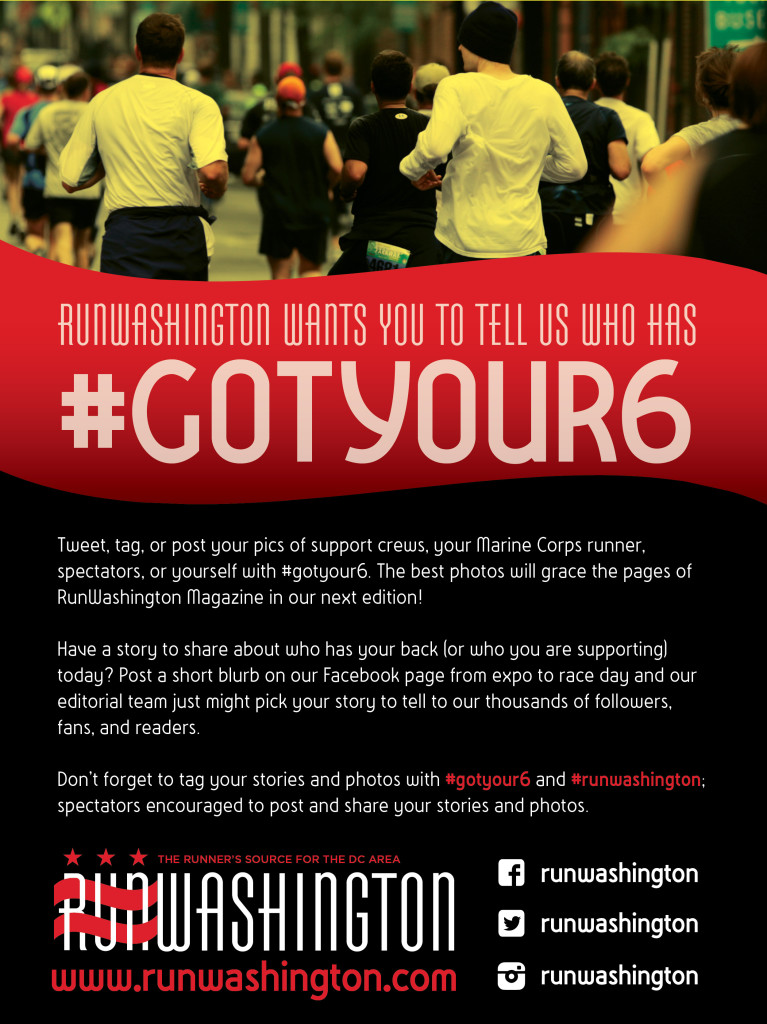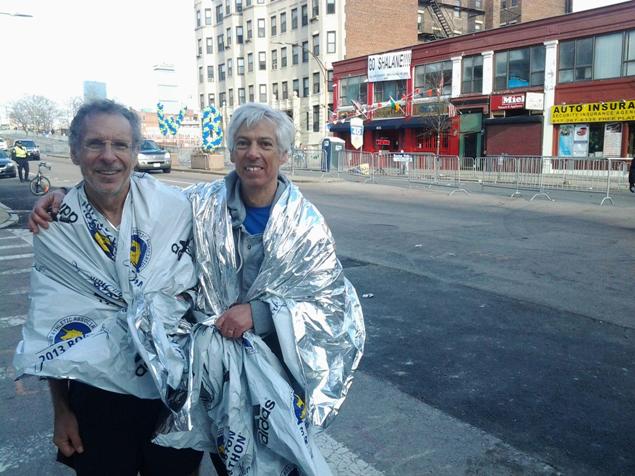
Don’t feel sorry for Ben Beach.
Yes, his goal of a string of 45 consecutive Boston Marathon finishes seemed to end on a closed course just miles from the finish line last year, where two bombs rocked the city and the nation. And yes, a 46th consecutive finish would have made Beach, from Bethesda, the sole record holder for consecutive finishes, an achievement he had worked toward all of his adult life. He didn’t get to cross the finish line as planned and for two months, his streak’s fate was in limbo.
But the Boston Athletic Association decided to consider the more than 5,000 runners on the course after the race was cut prematurely short, “finishers.”
“I think all of us with long streaks take the BAA’s view that our streaks grew by one year in 2013,” he said, a week before he starts number 47.
But Beach, a man who embodies the tradition and ideals of the Boston Marathon, is defined by neither the race nor his remarkable streak. Given the gravity of that day, he can look past what would have been a culmination of 1,205.2 racing miles on the same stretch of roads.
“First of all, we’re talking about a day on which three people lost their lives and 270 others were injured, many severely,” Beach says. “So for me to talk about my run and the streak feels hollow.”
Perhaps. But the Boston Marathon, before the bombs, anyway, was a nice little race in its own right, with champions – anyone remember Lelisa Desisa and Rita Jeptoo? – thousands of qualifiers and hallowed, not hollow, history and records.
Beach was set to own outright a remarkable piece of that history with this year’s run. Since his first Boston as an 18-year-old Harvard freshman in 1968, Beach competed in lockstep – albeit one year behind – with Pennsylvanian Neil Weygandt, each runner doggedly starting and finishing every year. But age and injuries finally caught up to Weygandt, who ended his streak by sitting out the 2012 race. Upon completion of the marathon last year, Beach tied Wygandt’s record at 45 straight finishes.
As if it were that easy. The early decades featured a string of sub-2:40 finishes, including his Boston-best of 2:27 in the 1983 race. But 11 years ago Beach developed a hitch in his stride, diagnosed as dystonia, a neurological disorder related to Parkinson’s Disease. The problem made training difficult and forced Beach to curtail his weekly mileage. In more recent years, pre-marathon long runs have been no longer than the Cherry Blossom Ten Mile Run in Washington just prior to Boston.
Beach credits the streak’s current longevity to treatment at the nearby National Institutes of Health, where he is part of a long-term study and receives regular Botox injections that partially block spasm signals from the brain to the left hamstring. Beach walks with a slight limp and his training runs have grown necessarily shorter; these days he maintains most of his cardiovascular fitness through cycling and an elliptical trainer. Fifteen days before this year’s Boston, Beach completed his Cherry Blossom long run in 1:30:33. Would anyone be surprised to learn that Beach is the only runner to have completed every Cherry Blossom race since its inauguration in 1973?
So with family and friends scattered along the Boston course, Beach set out from Hopkinton with longtime friend, training partner and Cherry Blossom race director Phil Stewart. “We had planned on running in the 4:30 to 4:45 range, a time that would have put us at the finish a half hour after the bombs went off,” Stewart said. “But Ben was nursing a calf problem, and at 10 miles he felt a sharp jolt of pain through his calf, reducing us to a quick walking pace. At 17 miles, two of his three kids and a daughter-in-law joined us – I felt as if we had a guided escort into town.”
But by the time the entourage reached the 21 Mile mark, it was past 2:50 p.m. and the area around the finish line had devolved into chaos. As Beach and his crew passed Boston College, volunteers joined hands in the middle of the road, halting the race and announcing a temporary suspension.
“We had heard something about explosions near the finish line,” Beach said. “At first we didn’t know how seriously to take it. Then we heard sirens, saw police motorcycles, trucks and cars blow by us. Something was clearly not right…. We were on pace to finish in less than six hours, which is the last official time recorded. When the course was sealed off, we gathered, stood, sat and scratched our heads.”
The gravity of the situation slowly became clear. With a fading cell phone signal and before all such transmissions were halted, Beach’s son Carter accounted for Beach’s wife, brother, sister-in-law and friends waiting near the finish line. “That was a tremendous relief,” Beach said. “We had some close calls but overall we were very lucky.” But for a blown-out calf, Beach, his family and friends could have found themselves in the middle of serious trouble.
“It was a good day to be bad,” Stewart said.
“I’ll abide by whatever [BAA officials] say,” Beach said. “Boston has been such a wonderful part of my life and the BAA is always so accommodating for those of us who don’t technically qualify anymore. No matter what happens to the streak, I’ll be back.”
Actually, when pressed, Beach admits he’s got his sights set on another Boston milestone – one perhaps even more Ruthian than consecutive finishes. The great Johnny Kelley started 61 Boston Marathons and finished a record 58 times; depending upon how the 2013 race is officially recorded, and, of course, what the future holds, Beach would be 76 when he lines up for what could be his 59th finish.
“Now I’m not comparing myself to Johnny Kelley,” Beach added quickly. “He was a two-time Olympian and twice won Boston. [His starts and finishes] are a mind-blowing pair of numbers, in a different era, with different shoes, different everything.”
Beach has already matched Kelley at 17 for the number of sub-2:40 finishes. “But I don’t expect to run an 18th,” he said.
Look for Ben Beach at the starting line of next year’s marathon. And the one after that, and after that, and….
“My plan has always been to run Boston as long as I can do it,” Beach said. “It’s conceivable I’ll still be going but the body’s got to hold up. At each stage, you never know what’s going to happen.”
Now he’s in his best condition of the last few years. On April 21, he’ll get that chance to do what has hasn’t in two years — cross the finish line.
“It’ll feel better than usual, I know that,” he said. “It’ll feel a lot better.
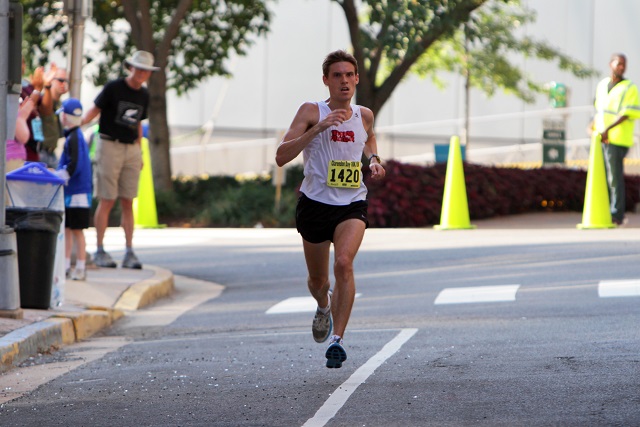
If the conditions are right, competitive marathoner Scott Allen, 27, of Washington, D.C., has his eyes on a PR in Boston.
It’s an ambitious goal.
A personal record at the monumental 2014 Boston Marathon on April 21 would mean beating his current record of 2:36:05 from the 2012 Rock ‘n’ Roll USA Marathon, where Allen placed third overall.
“Boston – there really is no experience like it,” Allen says. “I can only imagine how big the energy will be after last year’s bombings. It would really be great to PR.”
Allen came in 157th in the 2011 Boston Marathon and he is optimistic for another great run this year.
Because of the response to last year’s bombings and a higher number of qualifiers, though, the field is much bigger.
Allen had the same qualifying time as in 2011, when his bib number was 262. This year it’s in the 400s, which means there are an additional 200 people who had a faster seed time.
“It’s going to be huge,” he says. “It’s cool being a part of something that shows our response to last year’s bombings. We are not going to let this bombing deter us. People aren’t going to let that ruin such a big day for Boston and the country.”
After running the Rock ‘n’ Roll USA half marathon in March, Allen suffered a leg injury that kept him from running for two weeks. “This injury kind of set me back,” he says. “But I feel like I am almost back to where I need to be. I am not sure if I am going to be in my PR shape but I will have a solid race.”
Before the taper started, bringing him down to a weekly 55 miles, Allen averaged about 80 miles a week on some of his favorite routes: along the mall, by the Georgetown Waterfront, Capital Crescent Trail, Haines Point, Custis Trail – where he heads for the hills – and Rock Creek. “There isn’t really anywhere where I don’t like running,” he says.
“This season the most I did in one week was 82 miles,” Allen says. “I was hoping to get closer to 90 but I had a muscle injury and just wasn’t able to.”
Ideally, when he is feeling healthy, Allen takes only one day off a month.
A peak week usually includes a long run of 20-22 miles and two workouts – hard hill repeats and two by four miles at goal half marathon pace. The other days are filler runs – 8-10 miles– sometimes a bit more.
As for fuel, Allen loves his carbs. “The night before a race I like to have pasta – eat a big meal. For breakfast? A bowl of cereal.”
He doesn’t go for the healthy stuff. Cocoa Krispies did the trick in Delaware. Cinnamon Toast Crunch was his go-to before this weekend’s 20-mile long run. He isn’t sure which cereal it will be for Boston, but he plans to eat a lot of it, he says with a laugh.
As a third year law student at Georgetown, Allen is trying to get as much competitive running in as he can.
“I don’t know if it will be possible to run this much and be a lawyer,” Allen says. “I am just not sure if I can be quite as intense when I am working, but running is not something I am going to give up.”
Although he’s always been a runner, Allen didn’t know he’d have a gift for marathons until he crossed the finish line of his first: the 2009 Marine Corps Marathon.
“I had no idea how I would do on race day,” Allen says. “But I ended up with 6:08 miles. Being good made we want to keep going.”
Allen is originally from Wisconsin. He went to Marquette University where he ran cross-country and track.
“I’ve been running since middle school,” he says. “But I didn’t get into the 80 plus area until I started doing marathons. Some bodies just cannot withstand high mileage but I have good genes, good muscular structure.”
The highest mileage he ever did in one week was 102 – before Boston in 2011.
“That was kind of crazy,” Allen says. “It’s better to think long term. Do 60 miles a week and be healthy rather than trying to push it to 80. If you do that much you’re bound to get hurt.”
Allen is not exempt from that. A knee injury kept him out of last year’s Boston Marathon.
“It is disappointing to put in a lot of time and then get injured,” Allen says. “Every season I get another injury and I always think – ‘this could be the thing that takes me out of the season.’”
But so far, no injury has been bad enough to keep him from lining up in the first wave of runners in Boston later this month.
After Boston, Allen plans to take it easy until the fall season picks up. “You can’t be intense the whole year. I need those breaks from running a little bit,” he says. “After the marathon I’ll take one week of no running. I like to take it easy for a couple months and do no more than 30 or 40 a week. For the fall I’ll start in June to pick it up to 60.”
Now, Allen runs on the Pacers-New Balance racing team. On Boston Marathon Monday, he’ll be sporting a team black jersey and shorts. “I’ll be wearing New Balance because they sponsor our team,” he says.
For now, it’s all about getting to the starting line safe and healthy. And Allen’s focus is all Boston.
“With what happened last year, there will be even more energy so the whole atmosphere will be really neat,” Allen says. “There is nothing quite like being in a marathon with that many spectators. Nothing like Boston.”
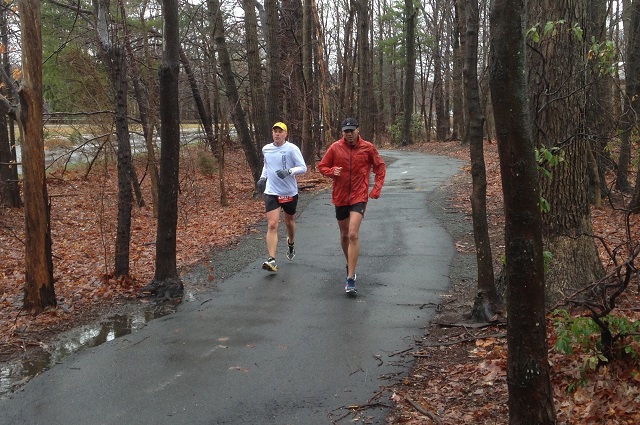
Registering for a marathon is speculation. Runners slap down their entry fees and play the averages, hoping for a good day months away. When a few hundred signed up for the Runners Marathon of Reston, forcing a sellout two months in advance, they bet that the late March race date would keep it out of the reach of winter weather.
No dice.
First came the rain, long before the runners showed for the 7:30 marathon start. Then, around 11, the sleet and hail. After noon, the later marathoners contended with snow.
[button-red url=”http://www.amazingracetiming.com/events/2014/2014-reston-marathon” target=”_self” position=”left”] Results[/button-red]Jody Reed hadn’t seen weather like this at a marathon before, and she was speaking from experience. Sunday’s race was her 100th marathon, a milestone she wanted to hit near her Ashburn home, and one that drew many running friends to celebrate afterward, some from Arkansas and New York.
“There aren’t too many races where you have rain, freezing rain, sleet, hail and snow,” she said. “We had everything but sunshine.”
And though the sport is called a marathon, her pace has resembled a sprint over the last 26 months — 44 26.2-mile races.
“You just go one foot in front of the other,” she said of running that many marathons. “It wasn’t intentional. You hear about people doing marathons and you decide to sign up too. I had to slow down so I could hit 100 at a local race. This is just such a personal race, they do such a good job and make it special, so it was the right place and time to do it (reach 100 marathons).
As for her resilience in the face of all of that running. “My husband says I’m kind of weird,”she said, He accompanies her anyway and was waiting at miles 21 with a beer for her. “I’ll be a little tight for an hour, but after I take my shower I’ll feel better.”
The course looped through residential streets and paved paths throughout Reston, was was staffed and managed by members of the Reston Runners. The marathon saw 203 runners start and 187 finish. In the half marathon, 352 started and 350 finished.
Boyd Harter came from a few miles away in Oakton to run the accompanying half marathon, encouraged by his wife, Gwen, who had also run the half in 2013, the race’s inaugural year. It was Boyd’s first half, and one that was fitting, given the road he traveled to get there.
“It felt like the weather threw everything at me this year,” he said. “About a third of us were huddled under cover during the national anthem, just trying to stay dry before we put ourselves through that.”
Despite the rough weather, Harter enjoyed the race and the distance, particularly the mix of roads and trails.
“There were long stretches of trail that were quiet, with no cars, not too many runners, that was the great part,” he said.
With the truncation of the former Montgomery County Marathon in the Parks, the Runners Marathon is the only suburban marathon in the Washington area, save for the indoor Grant-Pierce Marathon in the summer.
Habitual marathon runner Michael Wardian, of Arlington, cruised to an easy victory in 2:44:22, almost 25 minutes ahead of New York’s Christopher Baker, and in doing so broke the inaugural course record set by Lee Kaufman in 2:52:21. He was able to accept the Reston Runners’ invitation to run thanks to a few-days’ stopover after a trip to New Zealand and before tackling the North Pole Marathon.
He added roughly three kilometers to his race when the lead motorcyclist took him off course before realizing they were lost.
“That was actually good because I had to go to the bathroom but didn’t want to stop,” Wardian said. “Once I know we had already gone the wrong way and I wasn’t just running 26 miles, I felt like I had a little more freedom to stop. But I think the police officer got worried when I went into the port-a-john and he couldn’t see me. He thought he’d lost me again.”
Devin Nihill‘s 3:09:49 record withstood Front Royal resident Jill Atherton-Mellish‘s 3:34:55 winning time.
The hometown race served a decent chunk of the field. Rob Norwood lives roughly a mile from the course, which motivated him to sign up this year and last.
“It was miserable at the end, just sleet the last four miles,” he said. ”It was colder last year (roughly 35 degrees) but the rain made things worse. I was smart enough not to walk to the start this year.”
He gave a lot of credit to the volunteers, who didn’t have the benefit of building up bod heat while running.
“I dodged puddles, did math in my head,” he said about passing time during the race. “Last year I was going through a lot of life chances, so I had plenty to think about. This year, it was a little boring.”
Third place finisher Stacy Kirby ran the marathon on the suggestion of her Leonardtown, Md. training partner Jennifer Crain, who finished second.
“She was convinced I could qualify for Boston if I ran with her, and I did, by six minutes,” she said. “We started at qualifying pace and just got faster.
Crain had this weekend sketched out as a heavy training week for the Boston Marathon with a 26-mile run, so it made sense to do it with water stops and support on the course close enough to home.
They weren’t all local, though.
Glen Muromutu came from Hawaii to run the Queen City Marathon for Active Water in Cumberland, Md. as part of his goal to race in every state. When planning his trip, he saw he could knock out another state the next morning and made his move to Reston.
“Most ‘50 staters’ drive to their races, but I have to fly,” he said. “If I can add another race, the cost-per-mile goes down.”
Lourdes Martinez Guill came from New York City to run her first marathon on the suggestion of her friend Shasten Snellgroves, who attends graduate school at Georgetown University. Guill had volunteered at the New York Marathon last year, handing out water at mile 25, but saw a dramatic advantage in Reston.
“It’s packed with people, you cannot pace, “ she said. “Here, it’s just you and the road. People came out of their houses to cheer for people in the rain. It was wonderful.”
“You go numb, but never stop being cold.”
Snellgroves said she chose the race for her friends based in large part on the rave reviews it received on MarathonGuide.com.
“It’s pretty out-of-the-ordinary to hear so many great things about a first-year marathon,” she said. “We had to come and see it for ourselves.”
Silver Spring’s Jack Strausman is closing in on running a marathon in every state under 3:45. His 3:42 crossed Virginia off his list and earned him an age group prize–a matted photograph of a Reston trail, lit by a warm sunset. Simply put, an idealized version of a race that seemingly everyone hopes for when they sign up for a race.
It just doesn’t always turn out that way, as more than 550 runners and plenty of volunteers learned.
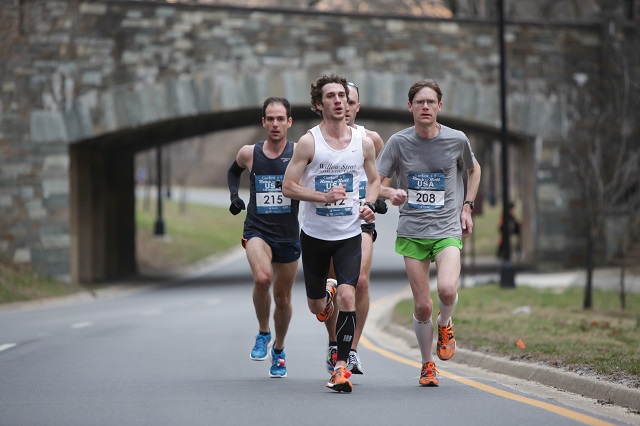
The leaders at the Rock ’n’ Roll USA Marathon left no doubts. Across the board, between the half marathon and the full 26.2 miles, both the men’s and women’s races held little suspense. Local runners represented the area well in the top groups of finishers, and after an endless winter, runners rejoiced for sunshine and warm temperatures on race day.
HALF MARATHON
[button-red url=”http://running.competitor.com/cgiresults?eId=54&eiId=174″ target=”_self” position=”left”] Results [/button-red] Abiyot Endale allowed a costumed Superman to lead the pack down Constitution Avenue, but Endale and a group of three other runners raced away from the field. Even then, the race effectively ended under the Kennedy Center overhang as Endale stretched his lead with a relentless, effortless-looking stride.
By the time he crested Calvert Street hill, the other runners couldn’t be seen and Endale ran alone. A smile and a wave to the drum corps outside Howard University served as a rare indicator he was even aware of the surroundings on his way to a 1:06:27 win in the men’s half-marathon.
Endale has proven himself as a capable winner before. He won the 2012 ING Hartford Marathon in Connecticut and set a course record that day.
Ayele Kassaye (1:08:29) finished in second on Saturday. Matt Rand (1:09:24) took third in his debut half marathon and finished as the first local man in the race.
On the women’s side, Christine Ramsey made the trip down from Baltimore to secure the only close race of the day, a 1:19:27 win in the women’s half marathon, ahead of locals Kerry Allen (1:19:46) and Teal Burrell (1:21:37). Ramsey improved on her third-place finish in this race last year.
Locals from Virginia and D.C. made up more than half of the approximately 25,000 registered runners, but the race still included participants from all 50 states and 33 foreign countries.
Dick Whitfield, Newark, Ill., drove to the nation’s capital for the weekend to visit family. He sat with Laura Whitfield, who lives in Baltimore, for an picnic with post-race snacks in the RFK parking lot.
“She sent me an email and said there was a fun run out here,” he said as he pointed to Laura. “Our winter’s been so terrible. I haven’t run all winter. I’m going to start training Monday,” he said with a laugh.
Laura said she hasn’t run much either. “We knew we’d finish. We weren’t out there for time.”
Weather typically sits at the top of the list for boring conversational riffs, but runners from across the country admitted that their training had suffered in some way from the barrage of snow and sub-zero temperatures this winter.
“We’ve run through snow, ice,” said Aubrey Brown, of Richmond. He faced the challenge of training with a friend in another city, Melanie Sala, who lives in D.C.
“We ran through the polar vortex,” Sala said.
The two embraced after the finish line. They ran all 13.1 miles together. The pair started training in November, and Brown completed his first race at this distance.
“We’ve known each other for a while,” Brown said, “and it was the next thing in line.”
“We decided this was an experience we wanted to share together,” Sala said. “Step by step.”
“I had to slow her down just a little bit,” Brown said. “Every time a band came or a small child appeared, she felt like she needed to speed it up a little bit,” he said, laughing. “I had four goals: the first goal was to start.”
“That is the most important thing,” Sala said. “Begin and then continue. That’s all you have to do.”
Brown’s other goals included avoiding injuries during the race, finishing and having fun with his friend.
“All the boxes checked,” he said.
Friends and families served as great motivators for many runners at this distance.
Erin Leo, D.C., tore her ACL playing basketball in college, and that’s when she started running half marathons. Her younger sister Kate Waldon, Boston, cheered for her sister during that first race.
“I thought she was crazy when she ran her first one,” Waldon said.
“And now she’s done like 15,” Leo said, “and is trying to get me to do a full.”
The sisters have run nine half marathons together, beginning with the D.C. half marathon race four years ago.
For Courtney Cecere, McLean, the Rock ’n’ Roll half marathon served as her first race after a new addition to her family, a now 13-month-old daughter. She trained for the event with a local group called Moms Run This Town.
“A baby changes the training time,” she said. “Not so much that it’s physically more challenging, but just the time juggling. Making sure my husband can be home if I run real early and adjusting when I run.”
Many finishers rushed for the coveted medal, a signifier of achievement, but Cecere had another idea.
“I’m excited to go see my daughter.”
FULL MARATHON
A former Olympian led the full marathon field from miles three to 11 on her way to the women’s title. Nuta Olaru ran 2:43:00, fresh from taking the crown at the 2014 USA Cross Country Championships, where she won the masters women’s 6k in February.
“I pushed when the men caught me,” she said. “I didn’t realize I was also first place. When the men caught me, I knew, oh my gosh, I was first overall.”
Olaru, competing for her native Romania, finished 13th in the women’s marathon at the 2004 Olympic Games in Athens, Greece. She now runs for the U.S. and trains in Longmont, Colo.
She said the Rock ’n’ Roll Marathon fit well with her training schedule because she’s headed to Boston in April. She finished more than 10 minutes ahead of second place, Rebecca Bader (2:53:10). Kristin Johnson (2:57:54) finished third and crossed the line as the first local woman.
“I didn’t actually realize she was running the marathon until I actually passed her and saw her bib,” said men’s marathon winner Adam Doherty.
Full marathon racers wore red bibs, and half marathoners wore bibs with a blue stripe.
“Success on every front,” said Doherty, who locked in his first place spot by about the halfway point and cruised to a 2:33:52 finish in his debut marathon.
“Definitely tough mentally,” he said of running by himself. “Just clicking off splits. That was really what I was looking for. I was hitting 5:50s pretty much the entire second half.”
Doherty, of Charlottesville, Va., said he wanted to run the marathon distance after his collegiate racing schedule ended with graduation last June.
“I’m really competitive, so I wanted to be in a race I could actually compete for,” he said. “I’ve knocked it off the bucket list I guess.”
Brian Benestad (2:36:32) took second. Eric Senseman (2:39:52) finished third and matched his place in last year’s race.
Several runners mentioned the timing of the Rock ’n’ Roll race because it happenes early enough to provide a firm benchmark between winter training and the Boston Marathon.
Dara Dalmata lives in Hopkington, Mass., the town where the famed marathon starts. She finished seventh in the women’s field on Saturday in her first race since Boston in 2011.
“I didn’t hit the wall at all,” she said. “I left the pace team at 23 miles. The pace team was great. You didn’t have to think. I would definitely recommend that to people if they want to break a time.”
The pacing groups received praise from many runners who credited the teams with providing a needed boost on the long course.
“That was fantastic,” said Veronica Mazariegos, D.C. “It’s lighthearted, keeping together, helping each other. And at the end, if you feel like you can, you push a little harder.”
Mile pacing and Boston’s big event were also on the mind of Mindy Ko, of Arlington. Her twin sister, Phebe will run Boston next year, so Mindy needed to qualify.
“This is the perfect course to do it because I don’t have to travel, don’t have to worry about those logistics. It’s kind of in my backyard as much as you can get.”
Although Ko has finished two Ironman triathlons, she’d never completed a marathon by itself.
“This is the first that I’ve done without walking and without biking and swimming first. In the middle of it, it was funny because you get these thoughts in your head. You see the Metro. You see the busses. And you’re like, oh my god, it’s so tempting. But you keep on running. You build this unspoken camaraderie in the second half.”
Marathoners split from the half marathoners near RFK Stadium, which brings them just within sight and sound of the finish line.
That tantalizing glimpse becomes a right turn toward another long stretch of road.
“It didn’t matter,” said Nico Gomis, D.C. He runs only two races every year, both marathons: Rock ’n’ Roll and Marine Corps. “After 20 miles, it’s all heart.”
FAST STATS
25,000 entrants
24,000 bottles of Gatorade
13,000 feet of fencing
6,625 latex gloves
3,600 Band-Aids
2,500 volunteers
2,500 road cones
375 Port-o-Johns
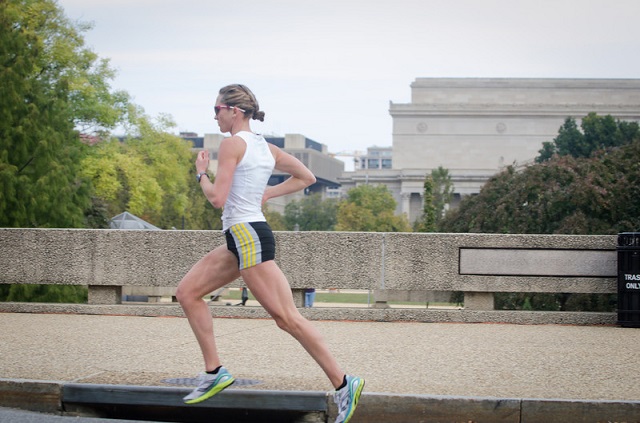
With a strong lead in the Marine Corps Marathon, Army Capt. Kelly Calway had her opportunity–run harder now or spend seven months regretting it. With an impending deployment to Kuwait waiting for her a week later, the cool day in Washington was her chance to take care of qualifying for the U.S. Olympic Trials.
She was able to pull things together and close out the race with a 2:42:15, 45 seconds to spare and a 5:48 lead over Gina Slaby. She finished 25th in the 2012 Olympic Trials while running in the Army’s World Class Athlete Program.
“My daughter is going to be thrilled,” she said. “Hazel is six and so competitive, she loves hearing about when I win.”
It was a somewhat surprising win, given the limited training window she gave herself. Busy with command responsibilities in Monitou Springs, Colo., she rotated out in advance of her deployment and had roughly a month to get into racing shape.
“I spent a lot of that time at Stanford with my husband, running my workouts on that great track,” she said. “I had about a week here after running the Army Ten-Miler (57:06 for sixth place) and got a good tuneup on Hains Point. They had the mile markers out.”
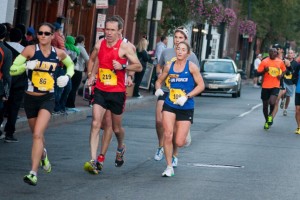
Though her parents now live in Washington State, Calway, then Kelly Brown, attended West Potomac High School and North Carolina State, and got to see teammates and friends from earlier in her career.
“Erin (Taylor) and Kelly Swain were out there on the course, I knew them from Lake Braddock and Erin from college,” she said. “Claudin (Hull) Magnum was out there, she went to state, too.”
Magnum, a Quince Orchard alumna, finished fifth in 2:50:47.
Five minutes behind her, Gina Slaby of Virginia Beach(2:48:03), and Emily Shertzer of Jonestown, Pa. (2:48:07), completed the military sweep of the women’s podium. Slaby is a Navy Supply Corps Officer and Shertzer works for the Army National Guard, while also serving in the Air National Guard.
Slaby qualified for the trials two weeks before at the Chicago Marathon. The other half of the duo, Shertzer, did a lot better than she had expected.
“I had a terrible month in September running a 20k (New Haven) and a half (Navy-Air Force Half) and it was not good confidence building,” she said. “July and August were great, so I was glad September was a fluke, but it really made me question my preparedness.”
| Top 10 women’s finishers | ||||
| 1 | Kelly Calway | 2:42:16 | 29 | Manitou Springs, Colo. |
| 2 | Gina Slaby | 2:48:04 | 32 | Virginia Beach, Va. |
| 3 | Emily Shertzer | 2:48:08 | 33 | Jonestown, Pa. |
| 4 | Emily Potter | 2:50:25 | 34 | Southern Pines, N.C. |
| 5 | Claudin Mangum | 2:50:48 | 32 | Raleigh, N.C. |
| 6 | Rachel Booth | 2:51:25 | 32 | Springfield, Va. |
| 7 | Samantha Bower | 2:53:32 | 23 | New York, N.Y. |
| 8 | Christina Noordstar | 2:55:01 | 37 | Tierra Verde, Fla. |
| 9 | Paula Pridgen | 2:56:05 | 27 | Charlotte, N.C. |
| 10 | Amanda Allen | 2:56:41 | 26 | Boston, Mass. |
| Full results | ||||
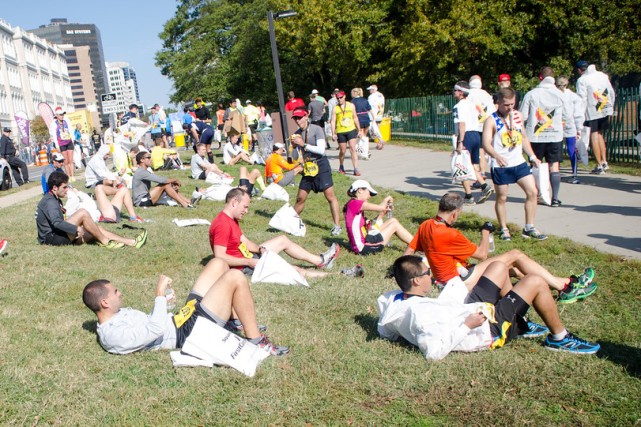
Much like Girma Bedada and Kelly Calway‘s efforts, Mike Kunzer‘s race at the Marine Corps Marathon was the culmination of years of preparation and training.
But Kunzer wasn’t focused on winning the race. He was thrilled to have finished, and it showed on his ebullient face.
“My coworkers had been nudging me to give this a shot,” he said. “It took a while but I got up to the distance.”
He credited his wife with supporting him through his training, dropping water bottles off for him during his long runs from his Manassas home.
“I don’t think I could have done it without her help,” he said. “She’s excited to run the Cherry Blossom race, now.”
More than 6413 runners from the Washington area finished the race, out of the 23,513 total, the second largest number of finishers in race history.
Andrea Burkhart of Washington, D.C. didn’t run as fast as last year, but didn’t mind being out on the course a little longer.
“It’s a lot more fun than running in Hurricane Sandy,” she said. “But it wasn’t so bad last year, because I came back and did it again, and I’ll do it again next year, too.”
She didn’t run as fast as in 2012, but that didn’t bother her.
“I ran a happy pace rather than all out, and that was a little more fun,” she said.
Rob Shepherd of Germantown, Md. was walking in a straight line after the race, durability he attributes to his diet.
“Eating real food, staying away from toxins and no meat,” he said. “Eighty percent raw, lots of juices.”
He didn’t find any vegan protein shakes at the various aid stations, but he still felt good for most of the race.
“I had to dig those last two miles, but it felt great to finish,” he said. “The support, the marines along the course, it was all great.”
As happens in many races, some characters dressed up for the run.
“It’s not a kilt if you wear shorts underneath,” said German Alba of Great Mills, Md., clad in a tartan-patterned cut of wool and apparently only a tartan-patterned cut of wool. “Otherwise you’re just a guy in a skirt.”
He was glad to have missed the windy 2012 race, which would have made him regret his wardrobe choice.
“It’s really, really, really comfortable,” he said. “So liberating. A few friends convinced me to give it a try a few months ago and I’m enjoying it. I saw a few other guys wearing them out there and we waved to each other.”
Matt Brennan of Vorhees, N.J. ran the entire race dressed as a cup of Dunkin Donuts coffee, a costume he wore in exchange for a late entry to the race.
“My girlfriend was running the race, her sister, my brother, my mom was running–it was her first marathon,” he said. “I heard they all signed up and I wanted to do it too.”
There was apparently a women running in an iced coffee cup costume, too. Brennan had run Chicago two weeks before, so he was trained for the distance. He probably prepared with a few runs in the costume, right?
“I tried it on for the first time last night,” he said. “It took a few miles to figure out how to run in it, how I could position my arms so it wouldn’t flap in my face. Once I got settled in, by 13 miles, I kind of forgot I had it on.”
It wasn’t all fun and games, though.
“I actually wish I had more caffeine in my system,” he said.
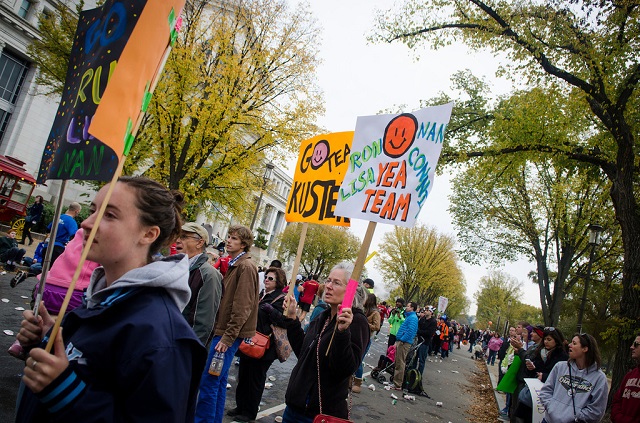
They hold their signs proudly while their eyes scan the road.
It’s not easy: being in the right place at the right time.
All the while they wonder: Do I have their pace right in my head? Did I miss them?
Kimberly Westrich was with her four-year-old son, Freddy. They had their first viewing spot at the Marine Corps Marathon staked out early enough to see the first wheelchair athletes come through.
There they were around the 15.5-mile mark – at the bottom of 15th Street, near the Tidal Basin – supporting Dad (Rick Westrich, 43) during his first marathon.
After a couple hours of waiting, it all happened so fast.
“Rick!” she yelled
He swung back, gave her a kiss. He stepped up off the road, bent down to Freddy and planted a whopper on his cheek.
“I love you,” he said, as he ran off.
Kimberly picked up her backpack, took Freddy’s hand, and the two of them started walking to the corner of 15th and Independence.
Running for a cure
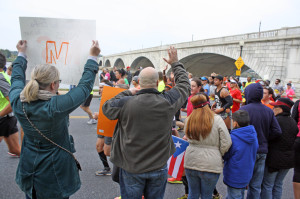
Vanessa Chapman described her daughter, Erika Ross, as her advocate.
Chapman has had multiple sclerosis for eight years. Since the diagnosis, she said, Ross has run or walked to support efforts to find a cure for the autoimmune disease whenever she can.
Ross ran the Marine Corps Marathon for Run MS. And Chapman, to be there with enough time to give Ross a hug before the race, left Baltimore by train at 6 a.m. After wishing her daughter luck, Chapman, who supports herself with a cane, waited for Ross in the family link up area at the Finish Festival in Rosslyn.
While Chapman waited with a friend and her daughter Ashley, Ross’ friends, Emily Downing and C.J. Aldrich, made their way to a spot between miles 10 and 11 on Rock Creek and Potomac Parkway, close to Memorial Bridge.
Ross and Downing have been co-workers for eight years. Aldrich, meantime, said he wanted to return the favor for all the support Ross gave him when he trained for and raced the Marine Corps Historic Half.
Downing’s sign, which she made for Ross, read, “Everyone runs but Erika runs for the cure.” Aldrich’s Halloween-themed sign, which Downing “made for everybody,” read, “It’s scary how fast you are running.”
Downing lives in Silver Spring, and has supported Ross at all of her marathons. That includes two MCMs, but also the New York City Marathon. They also do an MS Walk event together every year in Ocean City, Md.
“Anyone that can run 26.2 miles deserves some support,” Downing said. “If they can run for four hours, I can stand for four hours.”
Downing and Aldrich knew Ross’ goal time was 4:30. As a 4:15 pace group came through, they knew they had to start paying extra-close attention to the stream of runners heading south towards Hains Point.
As Ross ran by with the 4:30 pace group, Downing and Aldrich shouted her name and held up their signs.
Ross, full of pep, threw her hands up in the air as she passed, a sign she was having a great day. In the final miles, she surged ahead of the pace group to finish in 4:26.
When she arrived at the link up area, Ross was all smiles. Chapman, too, showed no signs of fatigue.
“I can’t tell you how proud of her I am,” Chapman said.
The Timelime
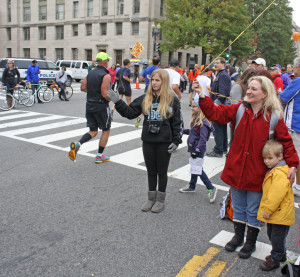
Kimberly Westrich had a plan. Actually, she had a timeline: the way she hoped everything would go plotted out on a spreadsheet.
Kimberly was supposed to get up at about 6:30. But she woke up at her home in Herndon two hours early, around the same time Rick woke up in his hotel near the starting line.
Kimberly and Freddy hit the road at 7:30 a.m. and drove to the Vienna Metro station, where they took a train to the Smithsonian stop.
They were easy to spot. Kimberly, following a tip, bought a balloon so Rick would have an easier time seeing them. The balloon – Freddy’s choice – was Simba from the “Lion King,” and it was attached to at least 10 feet of string.
At 15th and Independence, roughly the 17.5-mile mark, Freddy recognized Ann Schombert and her mother Catherine from their previous viewing spot. He took a shift on Ann’s cowbell and passed it around, while Catherine held up a sign above her head: “Go Tim.”
When Catherine’s brother, Tim Schombert, passed by, he stopped by the side of the road and admitted something that made everyone, including himself, laugh.
“Every muscle hurts,” he said, adding, “my training sucked.”
After Rick passed, Kimberly and Freddy made another very short walk to the intersection of Independence and 14th, just past the 20-mile mark.
Kimberly knew Rick was entering new territory. His longest training run was 18 miles.
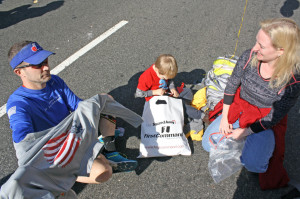
She found a spot in the long line of spectators stretching out towards the 14th Street Bridge. It was a frenzy: with the cheers, the upcoming water stop, the police trying to keep people out of the race course, and the drum group pounding out a relentless rhythm.
Freddy showed no signs of fatigue. He was, however, getting a little antsy – more interested in picking up leaves, it seemed. Kimberly kept Freddy at her side and her eyes on the runners coming around the turn. This was the last chance to see Rick before they headed to Rosslyn.
Simba swirled in the wind, floating up in the air above the runners’ heads. Freddy zoomed in.
And just when the thought crept in – Did we miss him? – there was Rick, giving Freddy a five without breaking stride.
On the way to the Metro, Kimberly – holding Freddy’s hand and carrying a not-light backpack full of dry clothes for Rick, extra warm clothes for them, snacks, water, and a sign she never used – talked about the change in lifestyle that had led to the marathon.
Rick is a personal trainer. They have long been active people. But after Freddy was born, and after many years of on-again-off-again running, they re-committed to running road races, thinking it would set a good example.
Kimberly has run a 10K and is working up to a half marathon. “I just so feel proud of my husband, because he worked so hard,” she said.
In the link up area, Freddy took a seat on the backpack, downed some juice, and settled in, while Rick pushed through the last couple miles to finish in 4:36.
Kimberly got a text. “Done.”
The next one read, “be there as fast as the crowd moves.”
He walked gingerly toward them, compression socks rolled down. He hugged them both and took a seat on the pavement – beat but happy. (“The pain is masked by the accomplishment,” he said.)
Kimberly smiled as Rick put on dry socks and a fresh shirt. Freddy honed in on a video game on Kimberly’s cell phone.
The day had gone according to the timeline.
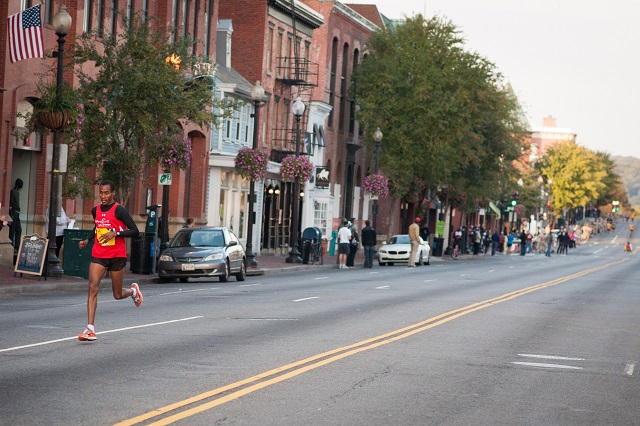
Wire-to-wire.
It almost has no place in any talk about a marathon, maybe only in a tall tale. The race is too long, too grueling, too open to disruption.
But Girma Bedada did it at the Marine Corps Marathon, running 2:21:31.
“I was in good condition and had good training,” he said through a translator. “I knew this week that I was going to win.”
It’s not a stretch, for a 33-year-old marathoner with a 2:13 to his credit. But without a prize purse to draw him here, versus other races with even a modest award, the Ethiopian, who has been living in the United States for seven months and living mainly in Columbia, Md., said a more universal currency attracted him.
“It’s a military race, I respect them,” he said. “When I learned about it, I wanted to do it.”
He went hard from the gun, averaging 5:25 pace for the largely-uphill first 5k before settling into running generally 5:15 pace for most of the race. He said he wanted to go for Jeff Scruffins‘ 2:14:01 course record. His modest lead grew more dramatic shortly after the first mile mark. He passed halfway in 1:08:59.
“I had a pain in my foot, but knowing I was going to win made it go away,” he said with a smile.
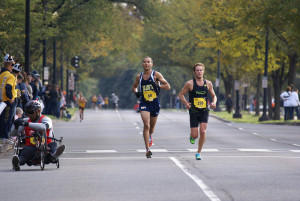
Coast Guard Lt. Patrick Fernandez took second in 2:22:51, reeling in Bedada as much as he could, cutting his 2:10 lead to 1:20 in the last mile and a half, but it wasn’t enough. Still, Fernandez, 26, an Alexandria resident, was buoyed by a PR and his all-time-best finish in the race, following a third-place finish in 2011 and sixth in 2012.
He followed coach George Buckheit‘s advice in putting his race together.
“He told me, don’t go out and be the aggressor, just kind of settle in, get an idea of the competition, and that’s what I did,” he said. “I sat back, I made sure to hold back on the downhills because some other runners were sprinting down them, but that early in the race it’s a good way to hurt yourself.”
That wasn’t an issue in mile nine this year, because a major course change eliminated a loop following Canal Road off of the Key Bridge, a tight turn and steep uphill into the Pallisades before turning down Foxhall Road into Georgetown. The course instead routed out and back on Rock Creek Parkway.
“You can’t complain about taking the hill out,” he said. “I really like running Rock Creek Parkway, it’s true racing, just tracking guys down, focusing on not letting anyone get any distance on me.”
Third place finisher Richard “Skeeter” Morris of Burkeville, Va. notched a roughly five-minute PR on his way to running 2:24:01.
“I could see the clock on my way up the last hill and just knew I had enough to get there, but not in time to break 2:24,” he said.
He was planning to go out at 5:30 and hold that, but the uphill that was not struck from the course, Lee Highway, held him to a 5:37 average for the first 5k.
“I didn’t get out the way I wanted, but I got a second wind from miles 13 to 20,” he said. “The last two miles were a little rough. My eyes were getting spotty going under the bridges.”
The 25-year-old coaches track and cross country at his alma mater, Nottoway High School, and recently coached at Longwood University.
Morris is coached by fellow William and Mary alumnus Ed Moran, a coach for the Pacers-New Balance team.
| Top 10 men’s finishers | ||||
| 1 | Girma Bedada | 2:21:32 | 33 | Columbia, Md. |
| 2 | Patrick Fernandez | 2:22:52 | 26 | Alexandria , Va. |
| 3 | Richard Morris | 2:24:02 | 25 | Burkeville, Va. |
| 4 | Timothy Richard | 2:25:57 | 25 | North Little Rock, Ark. |
| 5 | Michael Wardian | 2:27:06 | 39 | Arlington, Va. |
| 6 | Jake Buhler | 2:27:08 | 26 | Edmond, Ola. |
| 7 | Japheth Ng’ojoy | 2:27:51 | 25 | El Paso, Texas |
| 8 | Chris Pruitt | 2:29:41 | 31 | Arlington, Va. |
| 9 | Eric Delion | 2:29:50 | 30 | Winchester, Calif. |
| 10 | Ben Payne | 2:31:32 | 32 | Ft. Walton Beach, Fla. |
| Full results |
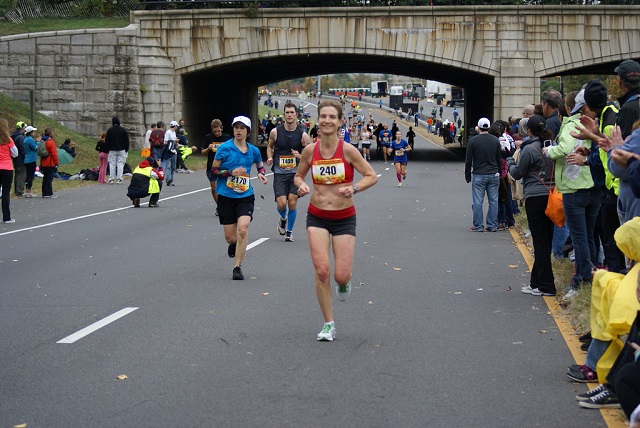
With the reopening of the federal government Thursday, the Marine Corps Marathon is back on for Sunday, Oct. 27.
The Marine Corps Marathon had announced, via Facebook, that the continued government shutdown imperiled the race. If the federal budget situation hadn’t been resolved by Saturday, Oct. 19, organizers would have had to postpone or cancel the race.
Race organizers’ hands were forced by a Tuesday report by ARLnow citing an Arlington County Police Department officer who coordinates road closures for events, including races. Lt. Dave Green said, ““I don’t want to put people in panic mode, but if as of Friday evening the government is still closed, it’s probably not going to happen,” ARLnow reported.
ARLnow’s report also shined light on the Army Ten-Miler’s contingency plans for a course rerouting.
The marathon had not commented publicly on specific contingency plans in light of the shutdown, which started its third week Oct. 15. Prior to its afternoon announcement, race officials held firm to the Oct. 27 date, saying the race was working with partners to ensure the race would be run as planned.
The shutdown, resulting from Congress’ failure to pass a continuing resolution funding discretionary spending, meant the closure of “nonessential” portions of the federal government, including the National Parks Service. During the closure, previously-granted parks permits are voided, which has already forced several races to postpone, cancel or relocate events.
More than half of the Marine Corps course is on NPS land, including the George Washington Memorial Parkway, Rock Creek Parkway, West Potomac Park, East Potomac Park, the National Mall and the Marine Corps War Memorial, commonly known as the Iwo Jima Memorial, site of the race’s iconic finish.
The situation lent itself to several alternatives:
- The race could have beenrerouted to avoid NPS land, though that option would likely require a flurry of planning and road closure applications, and would put runners on a route unlike any a previous Marine Corps runner had ever experienced. The inaugural race in 1976, for instance, was run almost exclusively on NPS land.
- Race organizers could have paid to reopen affected NPS land. Utah spent $1.67 million to open five national parks, two national monuments and a national recreation area for 10 days- $167,000 a day for Zion, Capitol Reef, Bryce Canyon parks, among others. The 30,000 registered MCM runners could raise that much for less than $5.06 apiece, and opening affected parks property would not require the extensive staffing of the much larger Utah parks.Not every registered runner would line up for the start, so a more conservative estimate — the average number of finishers over the past four races, just under 22,000 — could likely open the race for less than $7.60 apiece. For travelers with nonrefundable plane tickets and even locals who will want to sign up for another race to salvage a training season, it costs about as much as metro fare to and from the course. And, it’s less than 10 percent of the 2013 race’s $99 general entry fee.
- Congressional action could have reopened the affected NPS land for the race.
- Postponement of the race, similar to the Woodrow Wilson Bridge Half Marathon, one of the first races in the shutdown’s crosshairs, which postponed its original Oct. 6 date to Nov. 10.
The race has a significant economic impact on the region. A study by the George Washington University International Institute of Tourism Studies found nearly 69,000 people visited the Washington area to run in or watch the race, spending $38 million on food, lodging, entertainment, transportation and retail, which generated $2.7 million in local and state tax revenue.
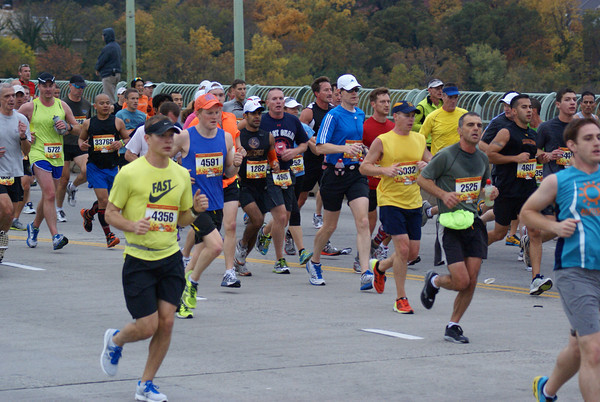
The Marine Corps Marathon will debut a registration lottery in 2014, a year after frustrations with registration management service Active caused thousands difficulty while they tried to register.
As announced in this year’s race guide, the lottery will open Feb. 23 and close March 15, and runners selected for the race will be notified March 19. The marathon has agreed to a multi-year contract with Race IT to manage registration.
Race officials will comment on the switch to the lottery system during this year’s race weekend, scheduled for Oct. 27.
The race sold out in just under two-and-a-half hours in March, faster (in 2:27) than all but six runners raced there last year. But for most people trying to register, it felt more like trying to sprint in the middle of a pacing group running 12-minute miles.
The error messages and frustrations with Active led many runners to question if the process for allocating 16,000 open registration spots was befitting an event that prides itself on efficiency. Traffic on the registration site overwhelmed the Active system, which may not have been upgraded following a similar incident.
The chaos meant that many of the aspiring registrants who had been trying since registration opened failed and others who came along later succeeded, discarding the race’s “first-come, first-served” policy for registration.
| Type of registrant | Number |
| Open registration | 16,000 |
| Charity partners | 4,500 |
| Active duty military | c. 4,000 |
| Previous year’s deferments | c. 3,000 |
| 17.75 k finishers | 2,200 |
| Frequent MCM runners | c. 1,000 |
| Sponsors | c. 500 |
| Approximate total | 31,000 |
Active pledged its proceeds from the signup, roughly $75,000, to two of the race’s charity partners: the Wounded Warrior Project and Semper Fi Fund.
At the time, Race Director Rick Nealis promised a comprehensive examination of the race’s registration process, with the prospect of a lottery system, similar to the Credit Union Cherry Blossom Ten Mile Run, the ING New York City Marathon and the Chevron Houston Marathon.
This followed Active’s failure to successfully handle demand for the Bank of America Chicago Marathon Feb. 19, which Active blamed on outdated equipment and a coincidence with an upgrade, according to Runner’s World. The Chicago Marathon suspended registration after four hours, with 30,000 successful entries processed, and allocated the remaining 15,000 bibs via lottery.
Problems started almost immediately for Marine Corps, two-and-a-half minutes in. Users reported reaching the checkout screen at the end of the process and receiving an error message. Others saw “system error,” “system unavailable,” and “it’s an exciting day today. We have a sell-out event in progress” while trying any number of steps in the registration process.
“It wasn’t exciting for the people seeing (those messages),” Nealis said. “It was embarrassing for us. This wasn’t up to our standards.”
Before the technical problems arose, he predicted the race would sell out in 82 minutes. He was well aware of the problems Active had during the Chicago registration, but was hamstrung in his options to do anything about it.
“They had 30 days to prepare, and they said they were testing successfully at a high volume,” he said. “You can’t drop a government contract like that, and even so, (what happened in Chicago) didn’t happen to us, so our agreement wasn’t violated.”
Marathon officials could not comment further on the state of the contract with Active.
Eric McCue, general manager of sports at Active Network issued a statement regarding the system failures:
“Active Network experienced system issues with registration for the 2013 Marine Corps Marathon today… for this, we sincerely apologize. We expected unprecedented interest for this iconic race but as the demand for registration shortened from hours to minutes, we experienced challenges. The race ultimately sold out in record time of 2 hours and 27 minutes. At Active, our mission is to connect people with the activities they love and we didn’t deliver on that promise today.”
Representatives from Active have not responded to specific inquiries about the cause of the system breakdown, or whether they had finished upgrading its systems in the wake of the Chicago registration.
Tiffany Davis, of Ashburn, didn’t get into the race last year, so she was sure to be at her computer well before noon, when registration opened.
“I was trying at 11:59,” she said. “When I wasn’t getting through, I tried every 10 minutes, then every five minutes. Nothing.”
She has been running for six years, spurred by an effort to lose weight after the birth of her youngest son. She’s worked her way up in distances and is determined to run a marathon in 2013. She chose Marine Corps because it was close to home and because of its reputation.
Erin Panzarella and her husband Mike registered successfully, but not without some trouble. The South Plainfield, N.J couple ran the race in 2010. He was set on racing again this fall, but she was content to watch. Until, that is, he successfully registered and she got the itch to run again.
“I started trying to register just to see if I could, but when it failed and kicked me out I got made and just wanted to register more,” Erin said. “When I couldn’t even get back in, I got angier and angier. Now I absolutely have to run this race.”
After running the race the last two years, Washington resident Anastasia Robinson was hoping to qualify for the Boston Marathon this year.
“I like being able to sleep in my own bed, and I know the course really well,” she said.
She slipped in under the deadline last year and knew she had to be ready at noon. She reached the Active sign in page before the site crashed on her. She refreshed as best she could while at work.
“I had a meeting at 1, so I had to step away,” she said. “When I got back at 2:30, it was too late.”
She ended up finding the charity partner Finish for Kids. She is a classical singer and her friend, also shut out of general registration, is a pianist, so the two are looking at venues for a fundraiser concert.
The marathon was an overwhelming winner of RunWashington’s recent Best of Washington Running survey’s “Best D.C. Race” and “Best Race to Spectate” categories.
Runners have a myriad of ways into the marathon. In June, a secondary market will open when the race administers open a bib transfer program. Registrants will likely advertise bibs for sale on Craigslist and other forums, including the marathon’sofficial Facebook page. More immediately, roughly 4,500 can commit to raising money for 130 different charities, with all of the proceeds going to the 501 (c) 3-registered nonprofits, in return for an entry.
Four thousand spots are reserved for active-duty military personnel, and approximately 3,000 runners will have deferred from the prior year’s race. Finishers at March 23’s 17.75k over the age of 14 earned guaranteed entries, approximately 2,200. The race sold out in an hour.
About one thousand runners who have done five Marine Corps Marathons get a longer window to register. Fewer than one thousand spots are given to race sponsors.
Nealis said that out of approximately 31,000 registrants, he expected 23,000 to finish. Last year, 23,519 runners finished Marine Corps, giving it the second most finishers in the United States, behind Chicago’s 37, 455, though New York, which drew 46, 536 finishers in 2011, was cancelled. In 2010, 20, 855 runners finished Marine Corps. The 2012 Marine Corps race sold out in 2:41, the 2011 race sold out in 28 hours and four minutes and 2010 took six days to sell out.


